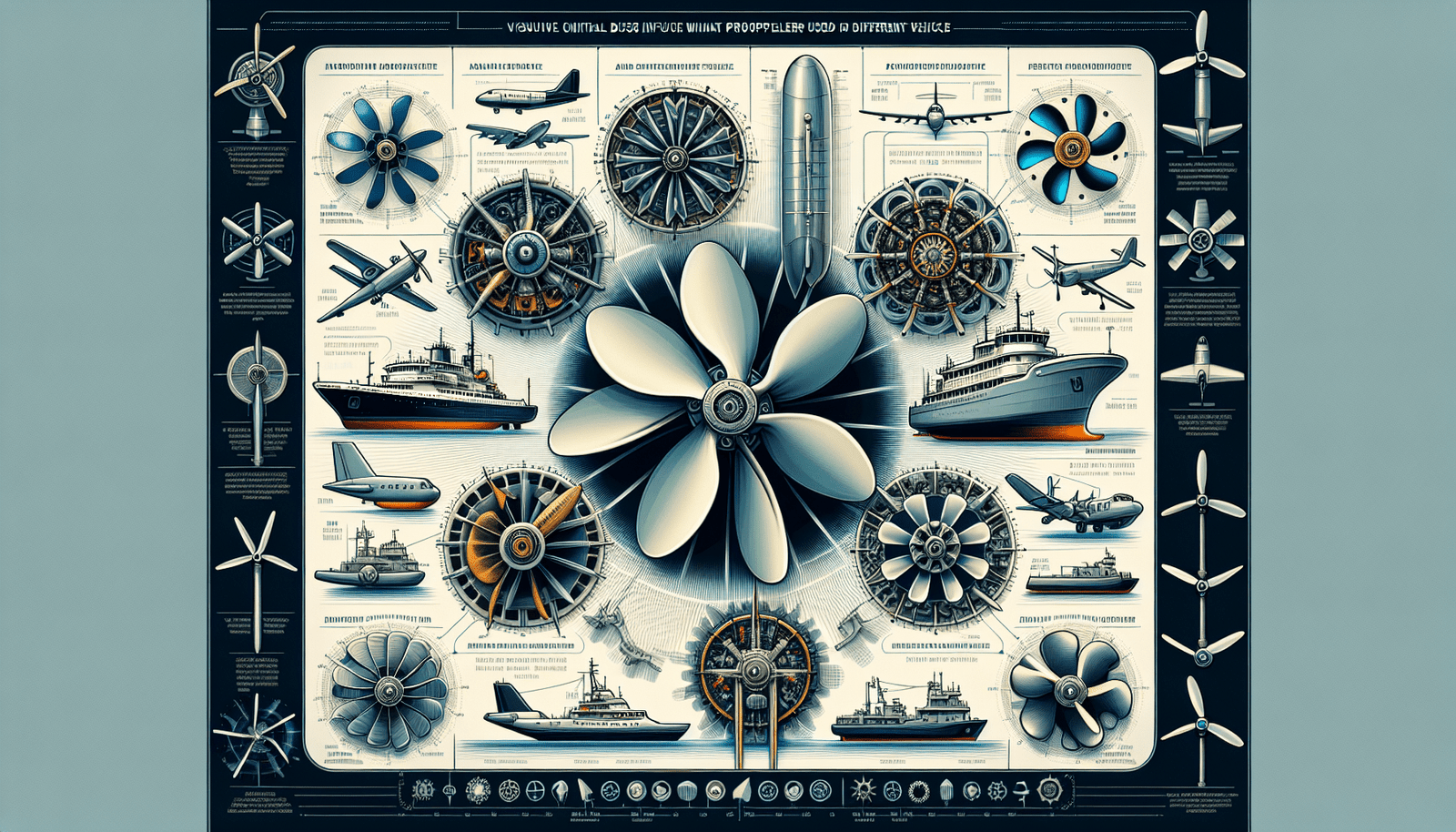Boosting the fuel efficiency of your boat starts with making the right choice of a propeller. Choosing an optimal propeller not merely maximizes your fuel efficiency, but it also enhances the performance of your boat, saving you time and money. This article will guide you through the factors you need to consider while selecting the most suitable propeller for your boat, from understanding the concept of pitch and diameter, to considering the material of the propeller and finally, offering tips on maintenance for long-term efficiency.
Understanding Propeller Basics
When it comes to sailing, propellers play a significant role. They aren’t just a metal piece that keeps your boat afloat, they’re the lifeblood of a successful, fuel-efficient journey. Here’s why.
Elements of a propeller
A propeller consists of several key elements. They include the hub, the blades, the root, the face, the back, and the tip. You can think of the hub as the propeller’s heart – it’s the blade’s central component that all other elements attach to. The blades, meanwhile, are the pushers that send your boat cutting through the water. They’re anchored at the root and expand outwards to the tip. The face (front) and back (rear) of the propeller take care of the pushing and dragging aspects of a boat’s motion, respectively.
How a propeller works
A propeller works on a simple principle. When spun, the blades push water backward, creating a force in the opposite direction that pushes your boat forwards. This is a metaphorical game of action and reaction in physics. As the prop spirals through the water, it creates a forward thrust that moves your boat.
Types of propellers
There are several types of propellers. The most common ones are fixed pitch, controllable pitch, and ducted propellers. As the name suggests, fixed pitch propellers have a constant blade pitch, while controllable pitch models allow pitch modifications in real-time. This keeps your boat cruising optimally at varying speeds. Ducted propellers, on the other hand, incorporate a round shroud that surrounds the prop, enhancing efficiency at lower speeds.
Materials used in propeller construction
Propellers can be made from a variety of materials, each with its pros and cons. Common materials include aluminium, stainless steel, bronze, nickel-aluminium-bronze, and composite materials like plastic. Your choice should depend on your vessel’s needs and the trade-offs you’re willing to make on factors such as cost, durability, and performance.
Identifying Your Vessel’s Needs
Choosing the right propeller isn’t only about understanding propeller basics. It’s also about knowing your boat’s needs. Here’s how to identify them.
Determining your boat type and size
Your boat’s type and size significantly influence the propeller you need. A larger, heavier vessel requires more power to propel, possibly necessitating a larger or more efficient propeller. Boat types also matter; a speedboat, leisure boat, and fishing boat each have unique propeller necessities, depending on their usage.
Identifying your boat’s engine capabilities
Your boat’s engine capabilities also play a significant role in selecting a propeller. Different engines have different power output capacities, which determine the kind of propeller they can handle. More potent engines can spin larger, more efficient propellers—giving you better and smoother sailing.
Understanding your boating activities and requirements
Your propeller should also complement your boating activities and requirements. If you’re using your boat for fishing in shallow waters, you might need a different prop compared to someone racing in deep sea waters. Always consider the weight of the gear or load onboard and the water conditions where you’ll be sailing.
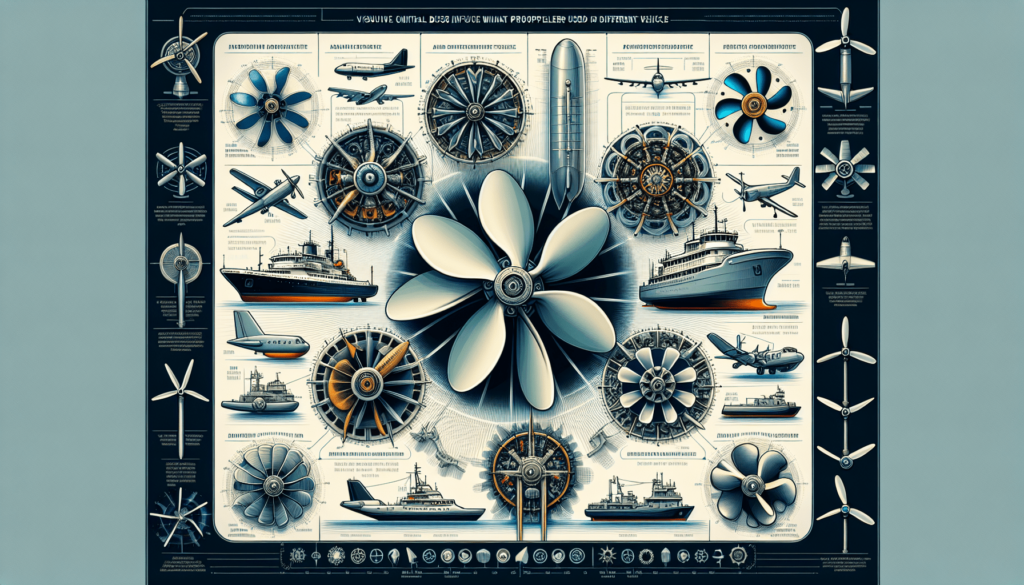
Exploring Propeller Sizes
When it comes to fuel efficiency, propeller size has a crucial role to play. Let’s understand why.
Correlation between propeller size and fuel efficiency
A correctly sized propeller directly contributes to your boat’s fuel efficiency. Larger propellers tend to move a larger mass of water, which potentially means higher efficiency. However, large propellers need more power to turn, effecting fuel consumption. Thus, finding the right balance between propeller size and your engine’s capabilities is crucial for fuel efficiency.
Considering propeller diameter
Your propeller diameter is equally important. A larger diameter propeller provides more surface area to push water and thus delivers a powerful thrust. But remember, larger propellers also require more power to spin and might overexert your engine if not appropriately matched.
Understanding propeller pitch
Propeller pitch is often misunderstood. It represents the theoretical distance a propeller would move forward in one revolution without slippage. Generally, a higher pitch propeller would move your boat faster at the same revolution per minute (RPM) as a lower pitch, but it might be harder for your engine to spin.
Understanding Propeller Blade Number and Design
Your propeller’s blade number and design can dramatically impact your fuel efficiency. Let’s see how.
How blade number affects fuel efficiency
Boat propellers can have three, four, or even more blades. More blades lead to smoother operation but can also add more drag, potentially reducing fuel efficiency. Three-blade models are considered an excellent trade-off between performance and efficiency, especially for speedboats, while four-blade and higher models provide excellent control and stability at lower speeds.
Choosing between three, four, or more blades
Your choice depends on your needs. If you value speed and efficiency, go for a three-blade model. If you prioritize control, manoeuvring, and stability, a four-blade model or more could be better. Keep in mind; this may come at a marginal cost to your top speed and fuel efficiency.
Examining blade design
Blade designs vary quite a bit. Some models offer wide, curved blades, while others have narrow, straight blades. Wider blades generally displace more water, leading to greater thrust but also more drag, while narrower blades may offer smoother, more efficient operation. Your blade’s right choice depends on factors like your boat’s size, engine power, and your needs.
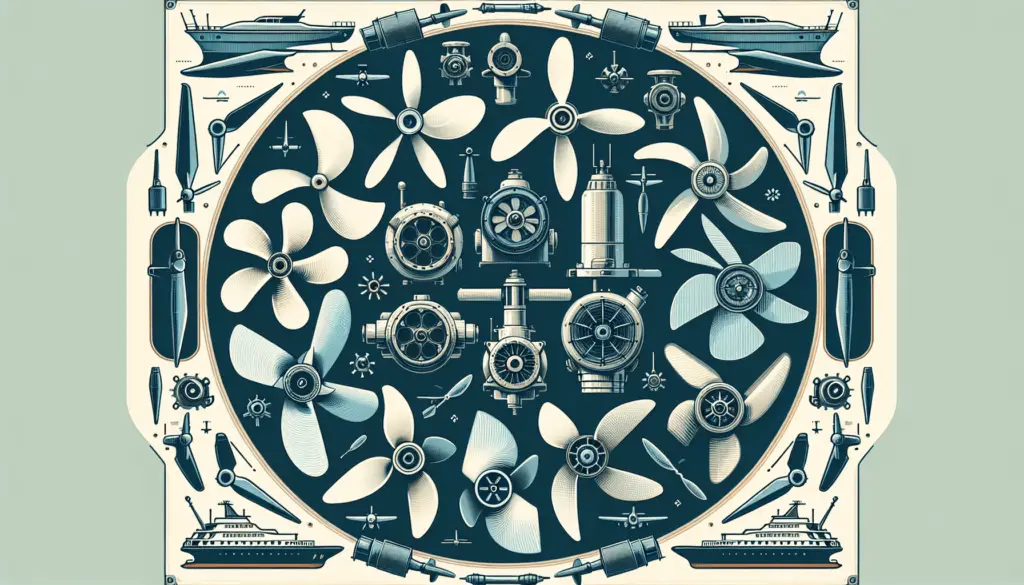
Importance of Propeller Material on Fuel Efficiency
What your propeller is made of matters more than you think.
Pros and cons of aluminum propellers
Aluminium is a popular propeller material. It’s light, cost-efficient, and suitable for most recreational boating activities. However, they might not be as robust or long-lasting as other materials.
Pros and cons of stainless steel propellers
Stainless steel propellers are stronger, offer better performance and last longer than aluminium models. However, they’re also more expensive – not just in upfront cost, but also for your engine. Stainless steel props can put more strain on your engine and drive train because they do not flex like aluminium.
Composite and plastic propellers
Composite and plastic propellers are another alternative. These lightweight models are inexpensive and easy to replace but usually don’t offer the performance, efficiency, or longevity of metal propellers.
Effects of Propeller Condition on Fuel Efficiency
Your propeller’s condition has significant impacts on fuel efficiency.
Impact of wear and tear
Like anything, propellers degrade over time. The wear and tear from continuous exposure to harsh marine conditions can gradually reduce your propeller’s performance and efficiency. Regularly inspect your propeller for signs of damage, such as nicks, scratches, or bent blades.
How damages affect propellers’ performance and fuel efficiency
Even small damages can significantly affect your propeller’s performance and fuel efficiency. For instance, a bent blade can cause more drag, reduce the prop’s overall effectiveness, and increase fuel consumption. If your propeller is damaged, it’s best to replace or repair it as soon as possible.
Maintaining your propeller
Regular propeller maintenance helps to maintain fuel efficiency. Keep it clean, regularly check for any damage, and ensure it’s correctly attached to your boat. Implementing routine inspections and repairs can significantly extend its lifespan, performance, and efficiency.
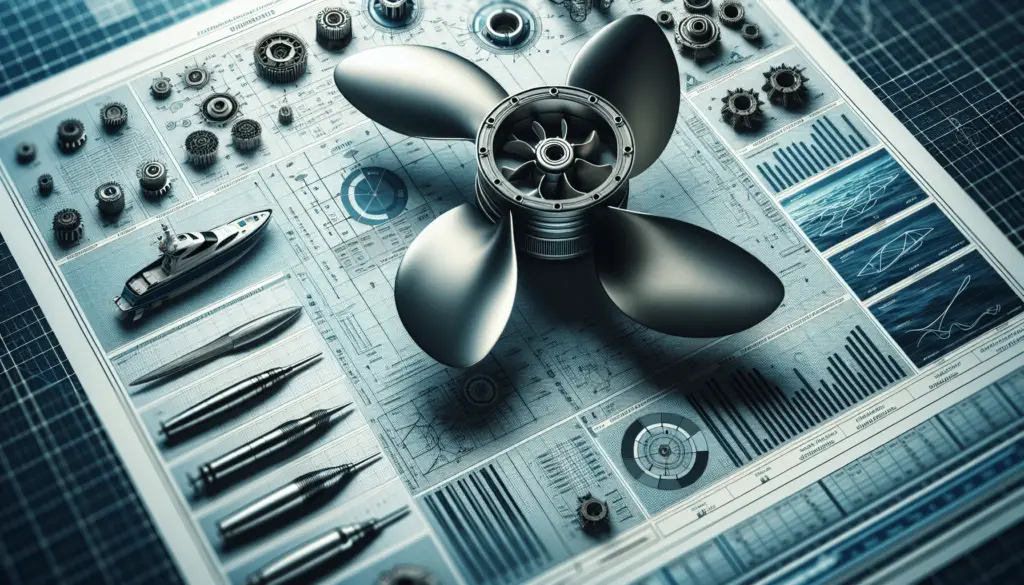
Properly Setting Your Engine and Propeller Combination
Fuel efficiency isn’t just about your propeller, it’s a team effort with your engine.
Balancing engine RPM and propeller pitch for fuel efficiency
The key to optimal fuel efficiency lies in balancing your engine’s RPM and your propeller’s pitch. Every engine has an optimum RPM range where it functions most efficiently. Your job is to select a propeller with a pitch that allows your engine to run within this range when at full throttle.
Finding the right propeller-engine match
Finding the right propeller-engine combination can be challenging, but it’s absolutely necessary for optimal performance and fuel efficiency. Your propeller should complement your engine’s capabilities and the specific conditions you’ll be sailing under.
Impact of Gear Ratio on Propeller Selection and Fuel Efficiency
Your gear ratio – the ratio between your propeller shaft and engine crankshaft speeds – also influences fuel efficiency.
Understanding gear ratio
A high gear ratio means your propeller turns slower than your engine, while a lower ratio means it spins faster. A high gear ratio typically results in greater torque, making your boat more efficient at low speeds. Lower gear ratios are most efficient at higher speeds.
How gear ratio influences propeller choice and fuel efficiency
Understanding your gear ratio can guide your propeller choice. If you do a lot of trolling and low-speed cruising (especially with heavier boats), look for a propeller that’s compatible with a higher gear ratio. For lighter boats that operate at higher speeds, go for a lower gear ratio and a suitable prop.
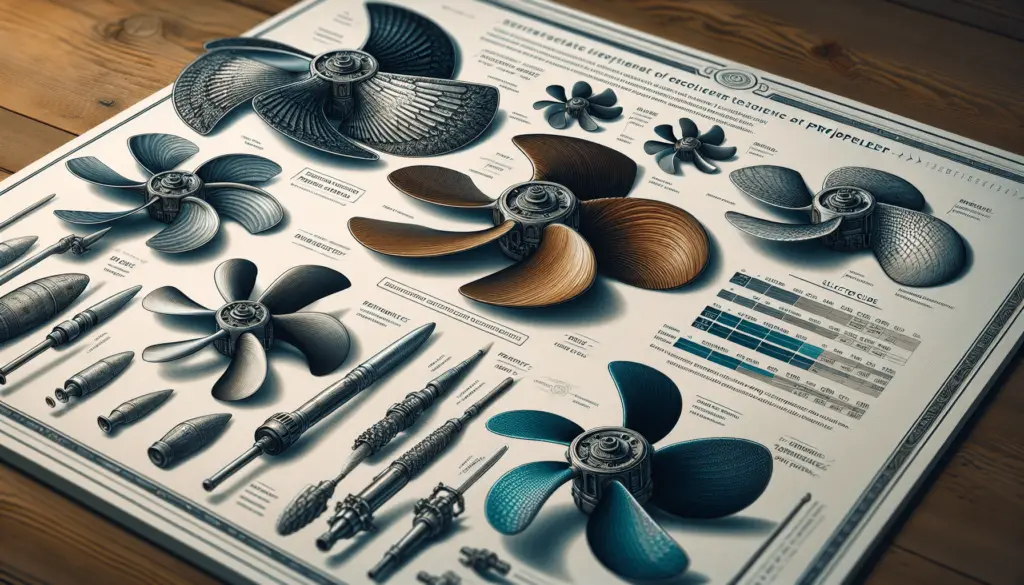
Navigating Propeller Manufacturers and Brands
As with any product, propeller manufacturers and brands can be a maze to navigate. Here are some tips to guide you.
Comparing propeller manufacturers and brands
Look into propeller manufacturers and brands before making your choice. Read up on their reputations, particularly in terms of quality, efficiency, and performance.
Considering warranty and after-sales service
Don’t forget to consider factors such as warranty and after-sales service. These aspects are just as important as the product’s price and performance. A good warranty can save you a lot of hassle and expense down the line.
Reading reviews and customer feedback
Read reviews and feedback from other boat owners. Their experiences can offer valuable insights into a propeller’s performance and reliability.
Consulting Experts For Propeller Selection
Finally, don’t hesitate to seek professional help when choosing a propeller.
Why professional advice matters
Propeller selection can be complex, and professionals in the field can guide you in your choice. They consider all factors – your boat’s specifications, your boating needs, and your budget – before recommending the perfect propeller for you.
Finding reliable boat and propeller experts
Finding reliable professionals can be a task. It’s always a good idea to start with your boat’s manufacturer or dealer, as they know your boat best. You can also explore independent experts and technicians in your area.
Getting a second opinion
As with any significant purchase, don’t hesitate to get a second opinion. It can help confirm that you’re making the right choice and give you peace of mind in your decision.
In conclusion, choosing the right propeller for fuel efficiency is a multi-step process that requires a good understanding of both propellers and your own boating needs. So, take your time, do your research, and don’t hesitate to ask for help if needed. Happy boating!

